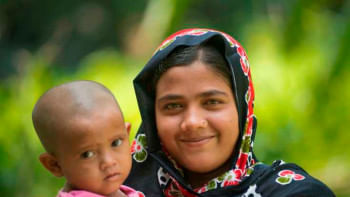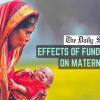Why this apathy to maternal health?

The indifference and lack of support still experienced by expectant and new mothers in Bangladesh, especially those from low-income backgrounds, is quite shocking, to say the least. Many pregnant women still do not go to healthcare centres for the necessary prenatal checkups, and when it comes to postnatal care (PNC), the situation is equally worrying. According to a Prothom Alo story, many rural women are not even aware of this essential service which they can easily get from local healthcare facilities of the government. The result is, they suffer from a variety of serious postpartum health complications, which can lead to deaths.
According to data from the Bangladesh Sample Vital Statistics 2022, 156 mothers die due to childbirth-related complications per 100,000 live births in the country. And according to the Bangladesh Demographic and Health Survey (BDHS), 20 newborns (from birth to 28 days) die per 1,000 live births. The numbers are quite worrying, more so because they demonstrate that we haven't been able to reduce maternal and child mortality at the expected rate. At a time when the government claims that it has improved healthcare services for expectant and new mothers, such a high number of deaths is unacceptable. This calls for urgent interventions from the relevant authorities.
New mothers are generally suggested to take postnatal services from trained healthcare providers at least four times after childbirth – the first within 24 hours; the second on the second or third day; the third on the fourth/fifth/sixth day; and the last on the 42nd day. But many seldom take these services. This is hard to accept given the fact that hospital deliveries have reportedly increased to 65 percent now from 53 percent in 2017-18. If only new mothers took these four PNC sessions, many life-threatening conditions they generally face could have been avoided.
It is, therefore, vital that the authorities take steps to change this situation. What they must first do is raise awareness among the families in low-income groups, especially in the rural areas, about the importance of both prenatal and postnatal healthcare. Local healthcare providers must encourage all expectant and new mothers to take services from nearby healthcare facilities. They should be especially encouraged to take postnatal care which can detect malnutrition, anaemia, high blood pressure, fistula and other complications on time, and lead to proper treatment.
Equally importantly, child marriage must be stopped at all costs. Doing so can significantly decrease maternal mortality caused by childbirth. Experts have also suggested that the PNC services should be linked with the government's immunisation programmes in order to encourage women to take these services. With proper approaches and effective interventions, the current situation can indeed be reversed.


 For all latest news, follow The Daily Star's Google News channel.
For all latest news, follow The Daily Star's Google News channel. 








Comments